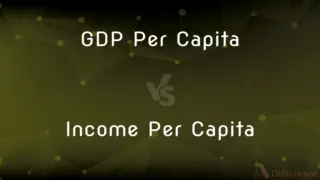Educational Sociology vs. Sociology of Education — What's the Difference?
By Tayyaba Rehman — Published on November 30, 2023
Educational sociology applies sociological theories to education system analysis, while sociology of education studies societal influences on educational systems and processes.

Difference Between Educational Sociology and Sociology of Education
Table of Contents
ADVERTISEMENT
Key Differences
Educational Sociology and Sociology of Education, while seemingly synonymous, operate on different focal points within the broader discourse of education and societal structures. Educational Sociology takes a keen interest in applying sociological principles, theories, and methodologies to understand and potentially enhance the educational system, thus serving as an application-oriented field. In a contrasting light, Sociology of Education explores how social institutions, structures, and processes influence educational systems and vice versa, thereby acting as a segment exploring mutual influences.
Dwelling further into Educational Sociology, this domain endeavors to decipher how sociological perspectives can be employed to comprehend and ameliorate the educational paradigm, fundamentally serving as a tool to enhance educational practices through sociological lenses. In comparison, Sociology of Education, while acknowledging the influence of educational systems on society, significantly dissects how various societal factors like class, gender, and ethnicity mold and are molded by educational structures and policies.
In the realm of Educational Sociology, a predominant interest is invested in utilizing sociological knowledge to facilitate a more enriched, egalitarian, and effective educational framework. It essentially views education through the lens of sociological theories, aiming to apply these theories for educational improvement. On the contrary, Sociology of Education leans towards unraveling the intricate tapestry that interweaves educational systems with societal norms, practices, and structures, emphasizing a bidirectional relationship between education and society.
Educational Sociology encompasses a spectrum that seeks to implement sociological findings within the educational landscape, potentially altering educational policies and practices to mirror sociological insights about societal functioning and needs. Distinctly, Sociology of Education digs deep into how education serves as both a product and producer of societal norms, values, disparities, and structures, critically analyzing education’s role and place within a societal context.
While Educational Sociology could be visualized as a proactive approach intending to drive educational changes through sociological understanding, the Sociology of Education could be perceived as more analytical and observational, delving into the existing mutual influences between societal structures and educational systems. Both fields, albeit focusing on the interplay between society and education, prioritize different facets of this interaction, offering comprehensive insights from divergent vantage points.
ADVERTISEMENT
Comparison Chart
Focus
Application of sociological theories to education
Study of societal influences on educational processes
Aim
Enhance educational systems
Understand relationship between education and society
Approach
Proactive, applying sociology to education
Analytical, exploring education's societal impact
Perspective
Views society through the lens of educational systems
Views educational systems through the lens of societal factors
Interdisciplinarity
Often collaborates with educational development
Often engages with broader sociological discourse
Compare with Definitions
Educational Sociology
Educational Enhancement
Through educational sociology, curriculums are enhanced by understanding social dynamics.
Sociology of Education
Societal Examination
The sociology of education examines how societal structures influence educational paradigms.
Educational Sociology
Policy Development
Educational sociology can guide the development of policies in educational institutions.
Sociology of Education
Influence Study
The sociology of education studies how educational systems reciprocally influence societal norms.
Educational Sociology
Theory Application
Educational sociology seeks to apply sociological theories to improve educational practices.
Sociology of Education
Structural Analysis
Through the lens of the sociology of education, the intersectionality of societal structures and education is explored.
Educational Sociology
Educational Reformation
Educational sociology can lay the foundation for transformative educational reform.
Sociology of Education
Social Impact Analysis
The sociology of education analyzes the societal impact of varied educational approaches.
Educational Sociology
System Analysis
Analyzing school systems through educational sociology reveals patterns and potential improvement areas.
Sociology of Education
Educational Disparities
By exploring the sociology of education, researchers identify disparities stemming from societal inequalities.
Common Curiosities
Does sociology of education only analyze negative societal impacts on education?
No, sociology of education examines both positive and negative societal influences on educational systems and vice versa.
Is sociology of education related to social justice issues?
Yes, sociology of education often explores issues related to social justice, such as educational disparities and inequalities.
Can educational sociology influence policy-making?
Yes, educational sociology can inform and guide educational policy-making by providing sociological insights into education.
Can sociology of education impact curriculum development?
Yes, findings from sociology of education can influence curriculum development by highlighting societal needs and disparities.
Is educational sociology interdisciplinary?
Yes, educational sociology often intersects with other disciplines like educational policy, psychology, and development.
What methodologies are commonly used in sociology of education?
Sociology of education utilizes various methodologies, including qualitative and quantitative research, case studies, and comparative analysis.
Is educational sociology focused on implementing change?
Yes, educational sociology often seeks to apply sociological principles to enact educational improvement and reform.
Does educational sociology consider global educational trends?
Yes, educational sociology may analyze and consider global trends and variations in educational systems and policies.
Can findings from sociology of education be generalized globally?
While some findings might be applicable globally, sociology of education recognizes the variability and contextuality of educational systems.
Can educational sociology aid in addressing educational inequalities?
Yes, educational sociology aims to understand and potentially mitigate educational inequalities through sociological applications.
Can educational sociology explore the relationship between education and economics?
Yes, educational sociology may explore how educational systems and economic structures mutually influence one another.
Is educational sociology limited to formal educational systems?
Typically, educational sociology might focus on formal education but can also explore informal and non-formal educational contexts.
Does educational sociology consider the influence of teachers and administrators?
Yes, educational sociology explores all aspects of the educational system, including the roles and influences of educators and administrators.
Are there careers that specifically focus on sociology of education?
Yes, individuals might focus on sociology of education in roles related to research, academia, policy development, and more.
How does sociology of education interpret the role of culture in education?
Sociology of education critically analyzes how culture influences and is influenced by educational systems, practices, and policies.
Share Your Discovery

Previous Comparison
Steel vs. Mild Steel
Next Comparison
GDP Per Capita vs. Income Per CapitaAuthor Spotlight
Written by
Tayyaba RehmanTayyaba Rehman is a distinguished writer, currently serving as a primary contributor to askdifference.com. As a researcher in semantics and etymology, Tayyaba's passion for the complexity of languages and their distinctions has found a perfect home on the platform. Tayyaba delves into the intricacies of language, distinguishing between commonly confused words and phrases, thereby providing clarity for readers worldwide.












































